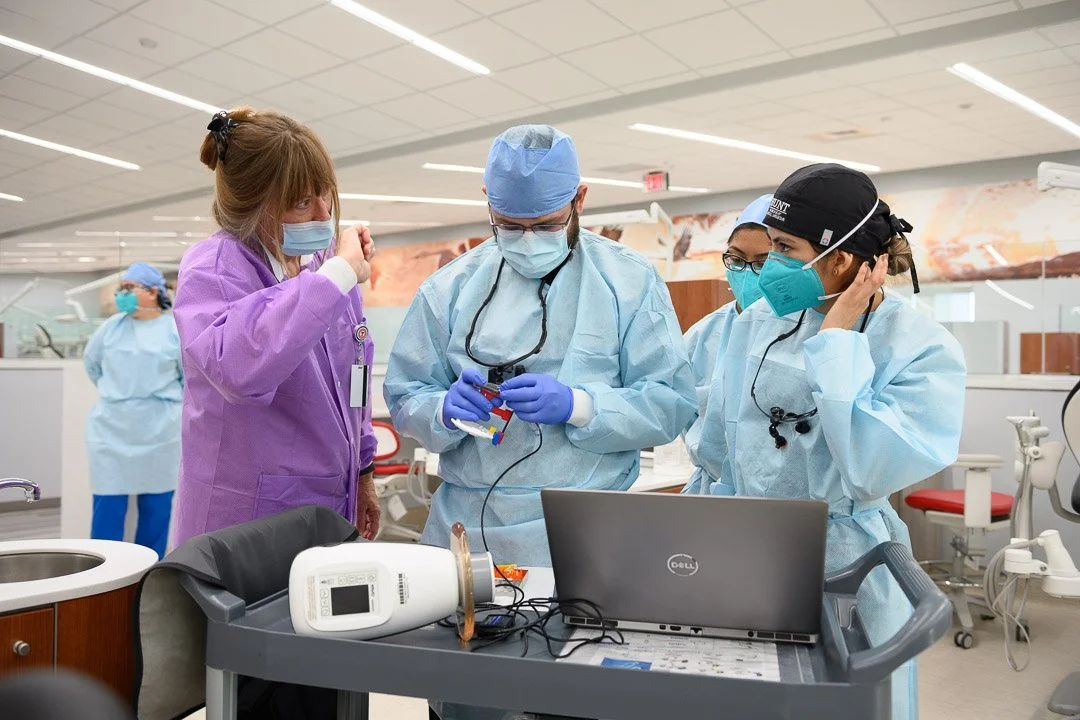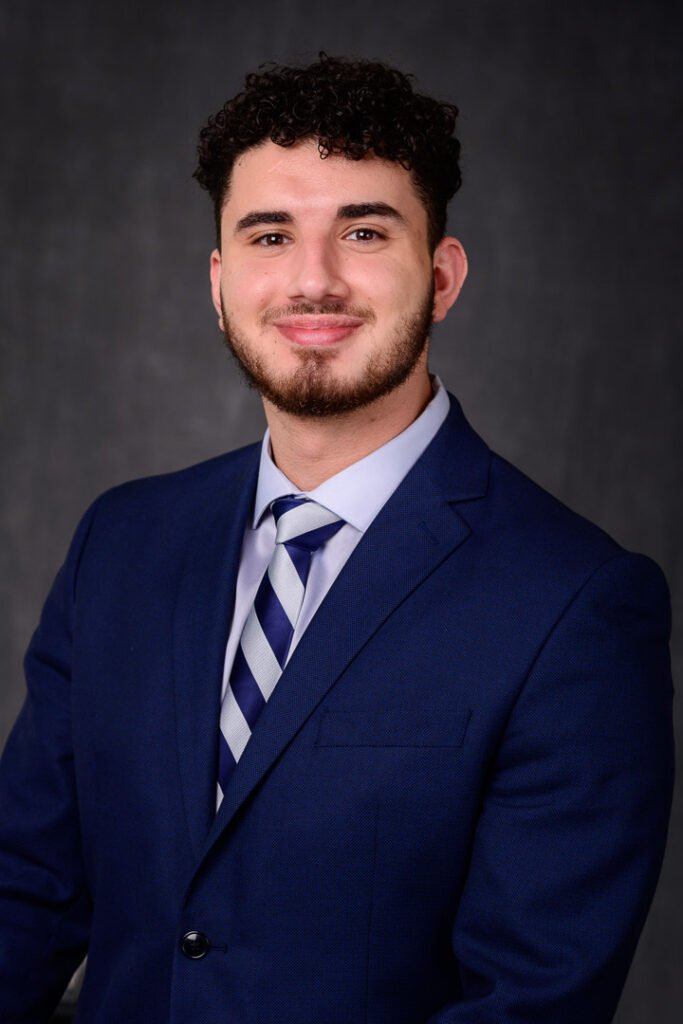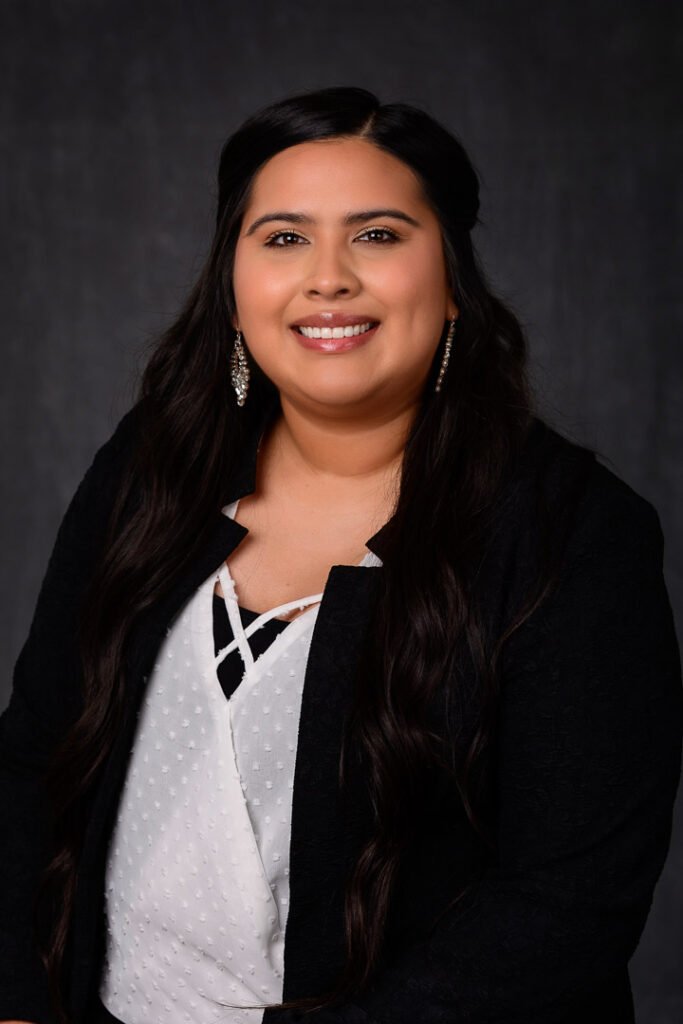Inaugural Dental Class
Hunt School of Dental Medicine Students Embrace Community, Gain Valuable Experience
The school’s inaugural class begins its journey in the Borderland, creating change along the way
Amjad Khuffash
As a youngster, Amjad Khuffash was cruelly teased for his crooked teeth. The Palestinian-American, born and raised in McAllen, Texas, rarely saw a dentist because of poverty, a common problem in the Rio Grande Valley where he grew up.
Now, Khuffash wants to make sure others in similar circumstances don’t go without dental care. The Hunt School of Dental Medicine, the first dental school in Texas in over 50 years and the only dental school in West Texas and the Paso del Norte region, is helping to make his dream happen.
“Some of the most significant factors that inspired me to pursue dentistry were poverty and the lack of necessary dental care I experienced growing up,” said Khuffash, a member of the inaugural class at the Hunt School of Dental Medicine. “After dental school, I plan to take affordable dental care to the residents of the Rio Grande Valley, so others don’t grow up experiencing what I experienced.”
Khuffash’s focus mirrors the dental school’s values, specifically because of the ethnic and socioeconomic similarities between his hometown and the El Paso region. Across West Texas, many suffer from poor dental health due to a lack of access to affordable care – in 2017, only 50% of El Paso residents visited a dentist. In El Paso County, there’s only one dentist for every 4,840 residents, compared to the national average of one dentist for every 1,638.
The Hunt School of Dental Medicine opened in July 2021 on the Texas Tech University Health Sciences Center El Paso campus to change those numbers. Prior to opening its doors, faculty and 35 community dentists began student interviews for the school’s inaugural class in September 2020, narrowing down over 900 applications for only 40 available spots in the class of 2025.
Sydnye Fields
Students train in the school’s Dental Learning Center, which features 80 stations equipped with high-tech simulation manikins and a fabrication laboratory where students craft dental appliances using 3D scanners and advanced CAD/CAM machines. This state-of-the-art facility allows students to practice modern dentistry for 2025 and beyond.
Eliminating Health Care Disparities
The school offers a curriculum that trains students to serve socially and culturally diverse communities to eliminate health care disparities in the Borderland and beyond. Community service and public health components are essential as students learn more about local health care topics, barriers and advocacy in the community.
Sydnye Fields, a member of the inaugural class of students, said she would never forget her first community service event.
“We were immersed in the El Paso community and shared the importance of oral health,” said Fields, who is fluent in Spanish. “It felt amazing to have these conversations with so many people, most of them Spanish speakers. So many of them didn’t know they needed to care for their teeth until we shared how important it was. It’s so much more meaningful knowing we’re reaching a population that’s often overlooked due to socioeconomic disparities.”
Anna Ceniceros
The Hunt School of Dental Medicine offers a unique education for students through culturally competent, hands-on training and an introduction to early clinical experiences among a diverse population. As part of curriculum requirements, dental students learn medical Spanish, bridging language and cultural barriers to deliver the highest quality of oral health care. It’s the first and only dental school in the nation that requires Spanish-language courses.
Early Clinical Experience
Perhaps most appealing to the dentists-in-training is a quick immersion into supervised clinical practice, which is central to the curriculum.
As part of efforts to improve the accessibility of oral health care in the community, the Hunt School of Dental Medicine offers reduced-cost dental care in its 38,000 square-foot public dental clinic, the Texas Tech Dental Oral Health Clinic. The clinic has 145 treatment chairs where students work with faculty to deliver oral health care to Borderland residents.
Students began working in the clinic within months of arriving on campus, a unique opportunity as most dental schools don’t provide clinical experience until the second year.
Anna Ceniceros, a member of the inaugural class of students, grew up in Clarendon, Texas, a small town with a population of just over 2,000. A child of migrant farmworkers and a first-generation college graduate, she has been waiting to sit in the dentist seat since childhood and feels the clinical experience brings front and center what she’s there to do.
Steven Venzor
“When I was in first grade, I had no idea who a dentist was. Then, as a class, we took a field trip to visit the nearest dentist two hours away. While I was standing in line, my classmates came out from their exam talking about their cavities. I didn’t know what a cavity was, but I could tell it wasn’t good.”
By the time it was her turn to sit in the patient’s chair, she was a bundle of nerves, but felt calm and excited when she left the room.
“He explained everything to me in a way that made sense, calmed my nerves and told me I didn’t have cavities. Before I walked out of the room, he gave me a puppy sticker that I still have today. I’ve never stopped thinking about that day, and I haven’t stopped thinking about becoming a dentist myself. Now I’m doing what I’ve dreamed about for decades.”
Staying in an Area of Need
The Hunt School of Dental Medicine is not just training a unique group of graduates but also encouraging them to remain in West Texas and underserved areas.
In the past 10 years, only 22 out of 2,390 Texas dental school graduates chose to practice in West Texas. Because most graduating dentists establish their practices near their dental schools, the Hunt School of Dental Medicine will help alleviate the severe shortage of dentists in the Paso del Norte region.
Paulette Ramirez
Student Steven Venzor, born and raised in El Paso, plans to help alleviate that shortage when he completes dental school. As a child, he had dental work done in Ciudad Juárez, Mexico. His experiences were challenging, from waiting in long lines at the port of entry to the quality of oral health care he received.
“As I got older, I realized everyone has different ideas of what they think a dentist is, based on their own experiences,” he said. “I want to show people, those who had negative experiences like me, that a dentist can be helpful. The people I want to impact are those in my own community. El Paso is my city. If there’s anyone who can understand the community, it’s someone like me who has lived here my whole life. I know how unique and special it is, and I see the need out there.”
Local student Paulette Ramirez also plans to practice in the Paso del Norte region following dental school.
“I grew up in Ciudad Juárez, Mexico, and through my teenage years attended middle school there. I started high school in El Paso, crossing the Santa Fe bridge every day,” Ramirez said. “My parents didn’t know English at the time, and we were constantly meeting with doctors for dental treatments and surgeries. I saw first-hand what makes a great dentist by watching them make my mom feel comfortable as they explained everything with so much patience. Every appointment was a learning experience and an inspirational moment for me.”
Like her peers, Ramirez plans to impact others, specifically in creating oral hygiene awareness in underserved communities.
“We can have such a big impact on the oral health of the region as we share the importance of oral hygiene with others, some who don’t even know what oral hygiene is,” Ramirez said. “But the impact isn’t just affecting the people we serve. It affects us each time we walk into the clinic or help someone find their smile. We’re doing something we’ve dreamed about doing for years, and what we’re doing is changing lives. That’s an amazing feeling.”






